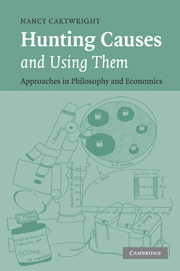Book contents
- Frontmatter
- Contents
- Acknowledgements
- Introduction
- Part I Plurality in causality
- 1 Preamble
- 2 Causation: one word, many things
- 3 Causal claims: warranting them and using them
- 4 Where is the theory in our ‘theories’ of causality?
- Part II Case studies: Bayes nets and invariance theories
- Part III Causal theories in economics
- Bibliography
- Index
3 - Causal claims: warranting them and using them
Published online by Cambridge University Press: 03 December 2009
- Frontmatter
- Contents
- Acknowledgements
- Introduction
- Part I Plurality in causality
- 1 Preamble
- 2 Causation: one word, many things
- 3 Causal claims: warranting them and using them
- 4 Where is the theory in our ‘theories’ of causality?
- Part II Case studies: Bayes nets and invariance theories
- Part III Causal theories in economics
- Bibliography
- Index
Summary
The problem: evidence for use
Vico reminds us that it is we who have created society, so its functioning should be transparent to us. It is natural science, not social science, that should be difficult, perhaps impossible. Why then is social planning and prediction so tricky? We can build and commercially reproduce lasers so precise that complex eye surgery is routine. But we cannot build a precisely operating secondary school system. What is wrong with our knowledge in the social sciences?
Nothing is wrong with our knowledge in social science, nor with how we ascertain it, I answer. We have a panoply of methods for warranting conclusions in social science that are well tried, well developed and well understood. My hypothesis is that our problems with social policy arise primarily from the fact that we do not know how to use the knowledge we can legitimately claim to have. For good policy we need to know how to predict the consequences of very specific measures as and where they will in fact be implemented. Knowledge, whether in natural or in social science, rarely comes directly in that form; and the kinds of settings, like the auctions for the airwaves, where perhaps it does, are contra Vico, seldom ones we can (or would wish to) create. In general what we know, different pieces of knowledge of different kinds, often from a vast variety of different sources, must be brought to bear on the questions at hand.
- Type
- Chapter
- Information
- Hunting Causes and Using ThemApproaches in Philosophy and Economics, pp. 24 - 42Publisher: Cambridge University PressPrint publication year: 2007

